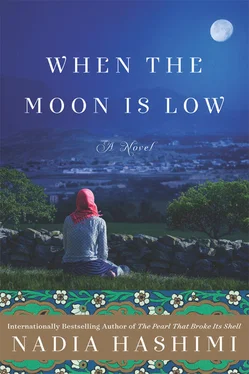Some of the young men in the square were reluctant to trust even the aid workers. Saleem was one of those people. He avoided making eye contact with the young people who walked through the park with their purple T-shirts, their organization’s name and logo printed in large type to identify them from afar. They asked many questions and even wanted to take pictures.
Saleem felt safer questioning their motives. He felt his chest puff to think he had outsmarted the aid workers, as if he had more street sense than those boys who let their stories be scribbled into tiny notepads or voice recorders. He did his best to steer clear of every one of them.
Until he saw Roksana.
“WE CANNOT GO ON THIS WAY, SALEEM- JAN, ” MADAR- JAN WHISPERED to him. Samira and Aziz had fallen asleep.
“What do you mean?”
“In a matter of days, we will have no more money and we still have a long road ahead. We cannot wait for a miracle.”
“I know.”
“Thank goodness you have at least found a way to work for food.”
Saleem bit his lip, thankful for the darkness. He’d told his mother that he’d been hired by a café in town to sweep floors and unload boxes in exchange for food. It was a plausible explanation, especially to willing ears. In reality, no one would hire him. Saleem had returned several times to the market and snuck through other shops, taking what he needed to feed his family. It was a sin imposed upon him, he felt. To make himself feel better about it, he ate just enough food to keep his hunger at bay. It was not easy.
“This job may not last. We need to get to England before the money runs out,” Saleem agreed.
“Yes, we do. We’ll also soon need more medicine for your brother. I cannot take him to any doctors or get him medicines here. It will cost more than we have and someone might turn us in to the police.”
“You’re right, Madar- jan, ” Saleem admitted.
Deciding when to embark on the next leg of their journey was a difficult decision. It was a gamble either way.
“We need to find a way to get to England. I think the train would be best, as Hakan had told us. Airports are full of checkpoints. Perhaps if we stay on the ground, our chances at slipping through will be better.”
“I’ll go tomorrow to find the train station and I’ll see if the Afghans know anything about the trains.”
“There’s something else, Saleem. We’ve got to make some hard choices now, and I’ve been thinking about this a lot. We cannot stay here in this room any longer. Even the price they have given us is more than we can afford. Our money is running out faster than I had imagined it would.”
This simple room with its exposed wires and badly cracked plaster, the decrepit sink from which water trickled — all this was a palace to Saleem. When he left Attiki and walked into this space, when he lay on the bed and felt the coils dig into his back, when he looked over at the second bed and saw his mother and sister sleeping two feet off the floor instead of outside, he was a king. This room let him rise in the morning without the hopelessness the boys in Attiki felt. It gave him reason to believe that fate had something more in store for his family than a rickety ship that would capsize in open waters. To give up this room was to give up so much. But to stay — to stay was to choose to bleed slowly and have no strength left to reach the tomorrow they hoped for.
“It will not be easy. We will need a safe place, especially for the nights.” Saleem knew some of the boys in Attiki slept only a few hours a day, afraid to close their eyes after sunset when a new world of dangers emerged.
“YOU LOOK LIKE YOU COULD USE SOME WATER. HERE,” SHE SAID IN what sounded like perfect English. Roksana, a volunteer with the aid group, held out a plastic bottle. Saleem followed the hand up to a slim wrist, a graceful arm. It only got better from there.
She wore a purple T-shirt tucked loosely into a slim pair of jeans. Her dramatically straight, black hair, fell loosely to the side as she tilted her head. She looked about his age, maybe sixteen. Her eyes, rimmed in black pencil, caught his attention with a flutter of lashes. She did not smile nor did she look at him with sympathy.
“Thank you.” Saleem took the bottle from her.
“Of course. What is your name?” she asked. Though she had a face that would inspire an overly romantic Dari love ballad, her tone was all business. She was the kind of girl so striking that she’d hardened her demeanor out of necessity, especially in a place like Attiki.
“Saleem,” he answered. And that’s all you’ll tell her, he reminded himself. But Saleem felt his defenses coming down as he looked into her eyes.
“Okay, Saleem. I haven’t seen you here before. How long have you been here?” He wished her to say his name once more.
“A few weeks. . but I am not staying here,” he said, suddenly feeling embarrassed that she might think he slept in the park. He took a casual swig of water.
“Oh? Where do you stay then?”
Another swig as his mind raced. Good question, he thought, and turned the conversation around.
“What is your name?” he asked gently. She paused and looked at her clipboard before responding. It was clear she was not happy with his question.
“Roksana.”
“Rokshaana?”
“No. It’s Rok-sa-na,” she repeated, emphasizing the pronunciation.
“But this is an Afghan name. . Rokshaana!” he repeated with a smile.
“It is my name, my Greek name,” she said, her lips pulled together tightly.
“But you know Iskandar, er. . Alexander. He married an Afghan woman. She was Rokshaana. It is the same name,” Saleem explained. It felt good to show her he knew a bit of history. She looked like she might have regretted approaching him but exercised patience.
“I am not her. My name is Roksana. And that is enough about my name,” she said. “Tell me, Saleem. Do you want to stay in Greece or do you want to leave?”
“Nobody wants to stay in Greece,” Saleem said quietly.
Roksana, less naïve than most girls her age, was not surprised to hear Saleem say this.
“Where are you trying to go?”
“England.” Saleem sighed. Saying it out loud, it seemed like an impossibly far destination. “My aunt is there.”
“Ah, England,” Roksana nodded as she looked out at the other refugees. “Yes, England is very popular.”
“Greece is beautiful, but Greece does not want us here.”
“It is a small country. The government does not have the money to help everyone.”
“But you. . you give food and help.”
“We are just people, not the government.” Roksana did not go into ideology or motives. She was not here to sing about the cause. It was her quiet presence that spoke to her beliefs. Saleem felt ineloquent around her.
“You do not agree with the government?” Saleem felt a little apprehensive for her. Where he came from, it was more than dangerous to blatantly oppose the thinking of those in power. Roksana was young and bold. His father would have liked her.
“We believe that people should be treated decently. We know what happens when people come to Greece, and we don’t think it should be this way.”
“People cannot apply for asylum here. Why is it so different?” Saleem had initially been frightened by the stories he’d heard about Greece from the boys in Attiki. He worried that the rest of Europe would be similar, a dead zone where his family would be adrift forever and in fear of being sent back to Afghanistan. The life of transience was exhausting both physically and mentally. But the Afghans he’d met also told him tales about the better worlds. Places deeper into Europe, countries like Germany, the Netherlands, and Sweden, did not turn up their noses the way Greece or Turkey did. Afghans there had been given second chances at having a normal life.
Читать дальше












